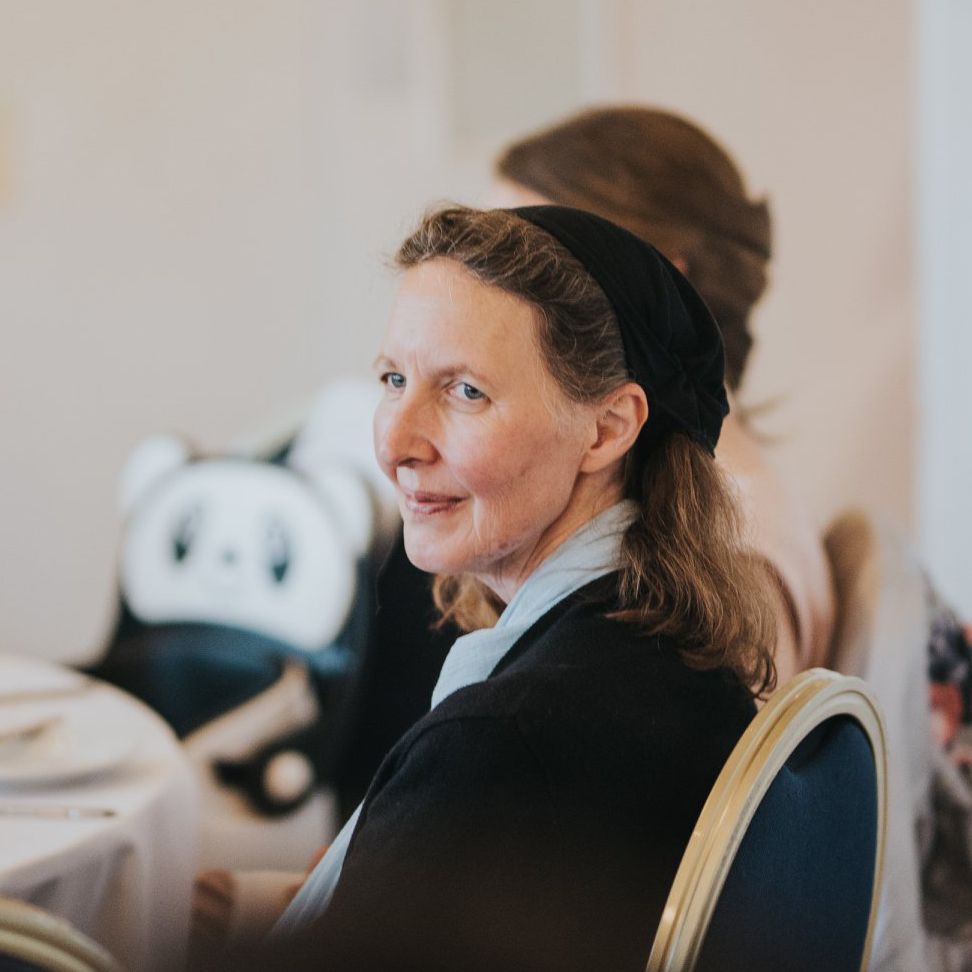Retirement
When it was clear in 1932, that the only military posting that CHTL was likely to get was to India, the decision was taken that it was time for him to retire. A posting to India would mean that Bill and Bob would have to be left behind in England to continue their education. With the great cost and time it took to travel from the UK to India the consequence of this would be that the boys would rarely be able to see their parents.
Neither Poppy nor CHTL wanted to sacrifice seeing their sons grow up and the relationship that they had with them, for the army: they had sacrificed enough over the years. Now they had the chance to settle down; have their own home and be able to be in charge of their own lives without feeling they had to answer to the military. As CHTL had been awarded the rank of Major-General, this meant that he was able to retire on a larger pension and so early retirement was an affordable option.
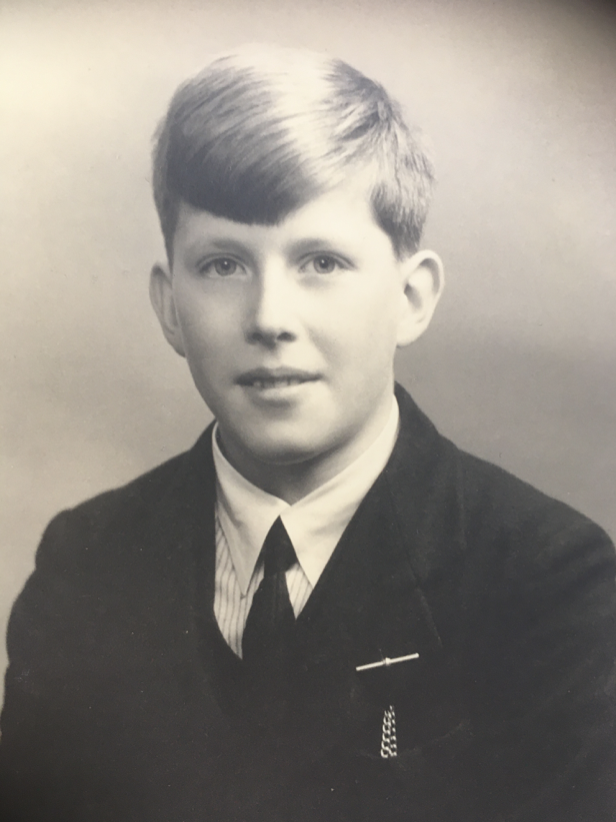
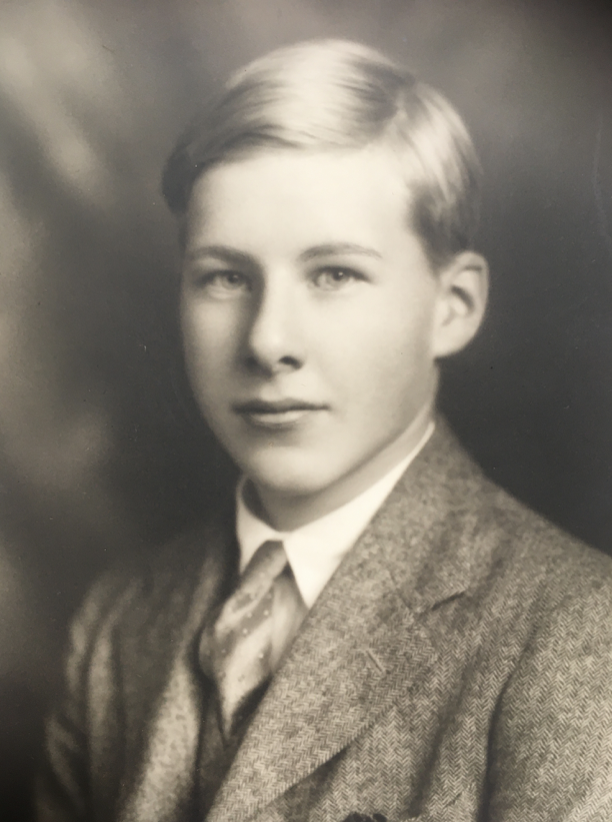
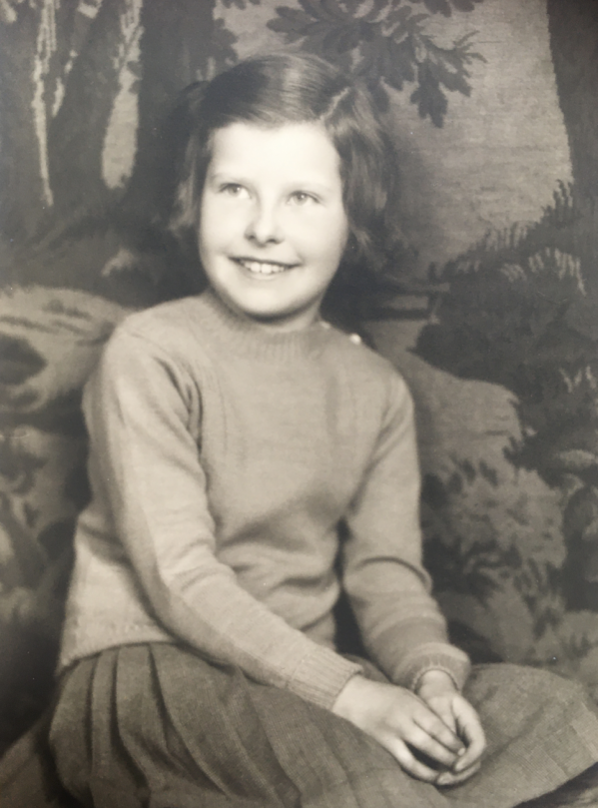
Although Poppy would have much preferred to have settled down in her beloved Devon beside the sea, she had to compromise yet again and agree to live in landlocked Hertfordshire under the close scrutiny of the domineering Lucas sisters. It might have been the case that CHTL was free from having to answer to the army but neither he nor Poppy was free from having to report to his family. At least Stevenage, the town chosen by CHTL to live in, wasn’t Hitchin or Welwyn where many of the extended Lucas family lived, but it wasn’t far away and Poppy felt under constant pressure to keep her nosy in-laws up-to-date with her day to day existence.
The choice of Hertfordshire made sense in the light of the fact that CHTL held the honorary title of Deputy Lieutenant of Hertfordshire. The duty of a Deputy Lieutenant was to assist in the performance of any public duty performed by the Lord Lieutenant. The Lord Lieutenant was appointed by the monarch, on the advice of the Prime Minister and was his Majesty’s personal representative in Hertfordshire.
The Lord Lieutenant’s prime duty was to uphold the dignity of the Crown. Within that remit, the Lord Lieutenant was expected to exercise the following functions:
- Arrange visits by members of the Royal family and escort Royal visitors.
- Present medals and awards on behalf of His Majesty.
- Participate in civic, voluntary and social activities within Hertfordshire.
- Liaise with local units of the Royal Navy, Royal Marines, Army, Royal Air Force and their associated cadet forces.
- Lead the Magistracy by chairing the Advisory Committee for the appointment of Justices of the peace and for the Appointment of the General Commissioners of Income Tax’.
The Lord Lieutenant of Hertfordshire at the time was Brigadier-General Thomas Walter Brand, 3rd Viscount Hampden GCVO KCB CMG (29 January 1869 – 4 September 1958). He was a British peer and soldier, the son of the 2nd Viscount Hampden. He served as an officer in the Hertfordshire Regiment, being promoted to Brigadier General during WW1. CHTL fought alongside him at Gallipoli and later at the Battle of Cambrai (1917) and the battles of 1918. It was Brand’s offer of serving as his deputy in Hertfordshire that CHTL had taken up.
Northwood
The house CHTL bought in Stevenage was called ‘Northwood’. It was a large Victorian house but far smaller than the Devonshire mansion Poppy had grown up in and smaller than CHTL’s childhood home, Foxholes, in Hitchin. Poppy didn’t mind the ‘downsizing’ at all; she had begun to learn to economise after realising that her father had been whittling away the family’s fortune with his excessive spending. She was very frugal, often cutting back when she could comfortably afford not to.
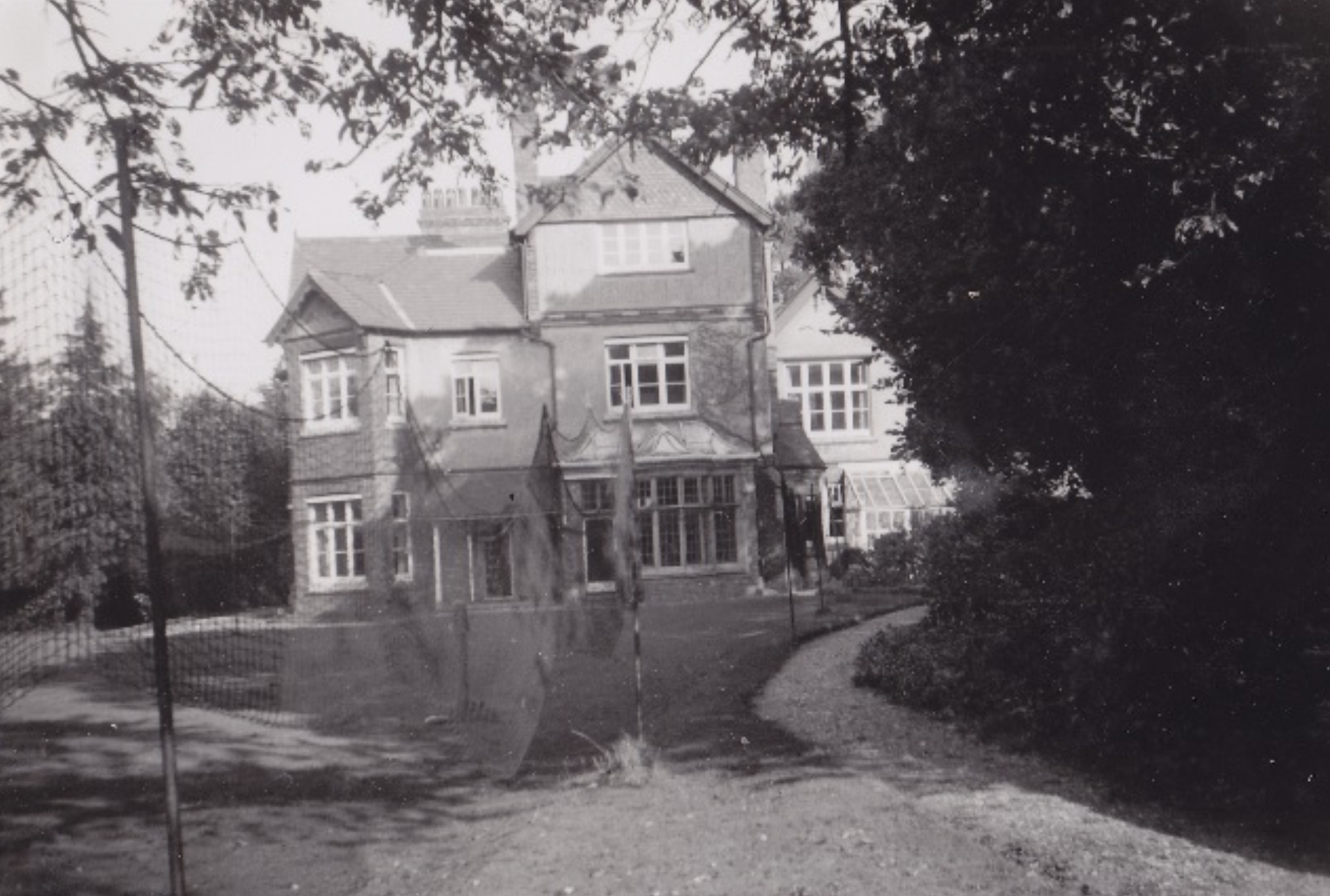
It was a comfortable house. There was a tennis court (of course) and ample sized gardens for CHTL to grow vegetables. One affordable luxury CHTL wouldn’t have installed in Northwood was gas. After seeing what happened in France as a consequence of gas attacks, he was very uneasy at the thought of having a potentially lethal weapon pumped into his home. Of course the gas used as domestic fuel was not the same as the gas used in the trenches but the memories and fears of those attacks lived on in the old soldier’s mind.
CHTL always carried with him a thick rope. He had a fear of being trapped in a burning building, so the rope was there to facilitate an escape if he ever needed it. This again possibly went back to his WW1 days and hearing about (if not seeng) what happened in towns and cities that were bombed and burnt by the Germans.
CHTL threw himself into the local community; serving as verger at the local church – an unlikely role for someone who had spent his life avoiding prayers and church services. However underneath it all he had respect for Christian beliefs, knowing that during his darkest hours in France, Belgium, Turkey, Sudan, South Africa and of course Ireland, prayers had been said daily for him by his devoted and devout parents.
Today is Sunday & I haven’t been to church. I really must make an effort as I haven’t been for months and months now & its not good for one, only out here Sunday is no different from any other day.
CHTL - Dec 23rd 1917
Religion, faith and belief were like feelings which CHTL did not find easy to express and for the most part kept hidden away. In later life his ‘spirit was willing’ to contemplate higher things from an emotionally objective distance on Sundays, but for the rest of the week, his ‘spirit’ was more than willing to join his ‘flesh’ in contemplating and thoroughly enjoying some of the ‘ways of the world’!Standing as a Tory Councillor was another way that CHTL felt he could serve his community.
The family home was stuffed full of CHTL’s war souvenirs. In 1917, CHTL collected a ‘suit of german armour, do for the occasional ball later on, one of our subalterns found it in the German trenches after the last push.’ Aug 3rd 1917
I am now collecting a large mass of trophies which I don’t think I shall ever be able to get home; machine guns, brass german shell cases and weapons of all sorts. Father asked me to send home to Hitchin as a present 2 field guns captured by the divn, that is rather beyond my scope of looting.
CHTL - Oct 3rd 1918
One of the brass German shell cases, which was well over a metre long was polished up and hung vertically on a frame made out of an old metal bedstead and used as a gong to summon the family to meals. At those meals CHTL, who disliked wasting time, would, rather rudely, finish his food before Poppy had finished serving the rest of the family and had sat down to eat.
CHTL also amassed large collections of stamps, coins, butterflies, birds eggs*, Egyptian glass, African spears and all sorts of memorabilia from the many countries that CHTL had lived in. He fascinated his children with his wide knowledge and sparked off their interest in collecting and learning about the world beyond the British shores.
* In 1954 the Wild Birds Protection Act made this hobby illegal as it began to threaten the survival of many wild birds.
In addition to being a philatelist, a numismatist, a lepidopterist and an oologist (stamp, coin, butterflies, birds eggs) CHTL displayed his knowledge of wildlife in the form of his numerous trophies from his many hunting trips in Africa and India, as well as Great Britain and Europe: along with the usual stag’s antlers, hare’s feet and animal skins there was an elephant’s ear – described to guests as the world’s largest hearing aid!
Stevenage
Stevenage was a large Market Town when CHTL purchased ‘Northwood’ as his family’s abode in the early 1930’s. It was not far from Hitchin where generations of Lucas’, had been born and bred. The population of the town at the time CHTL planted his roots was around 4-5000. This gradually rose to around 6000 and then with The New Towns Act 1946 exploded to 60,000 as part of the plan to develop 28 towns around the country.
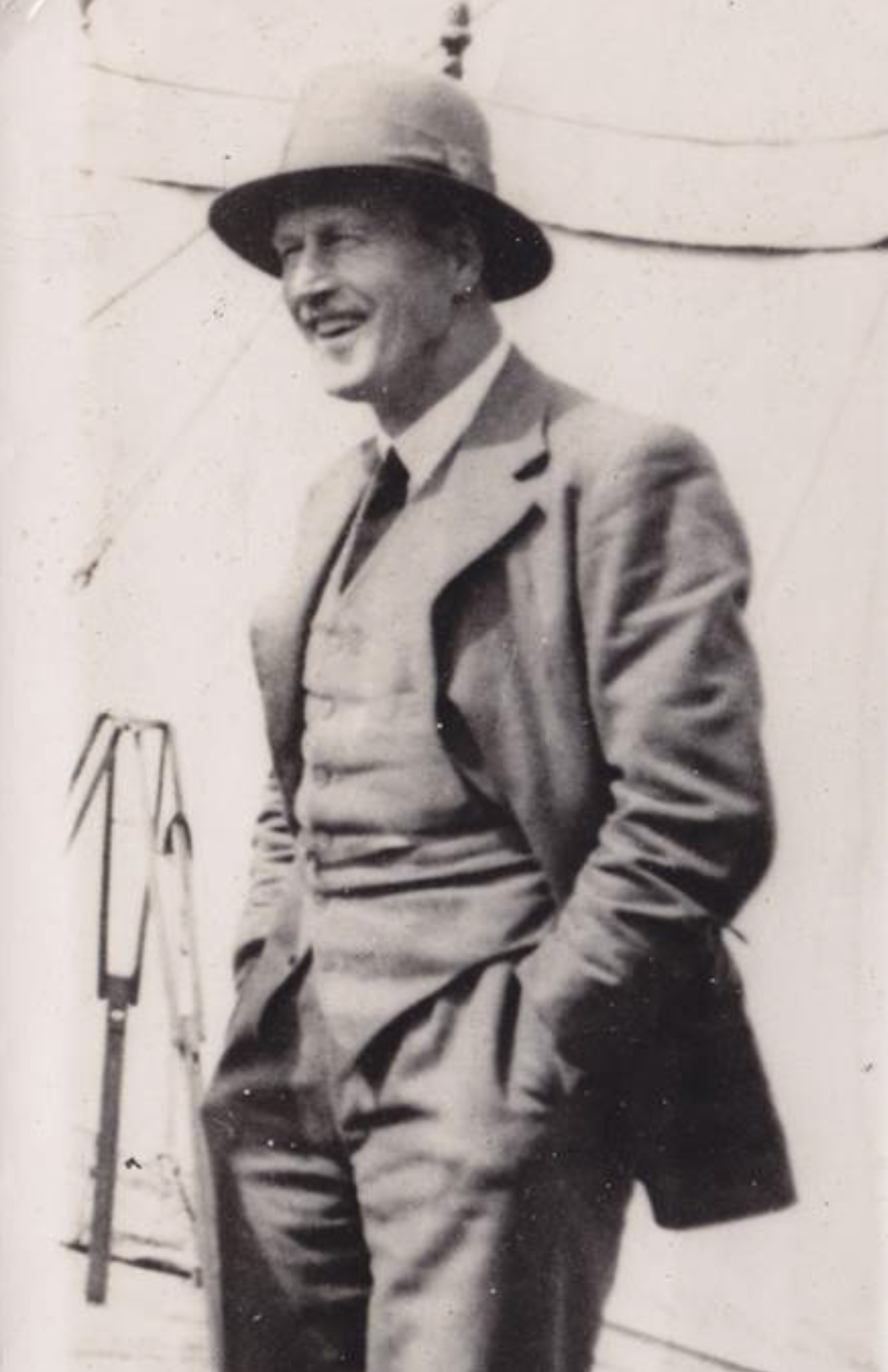
CHTL was in an elite minority in owning a car: ‘There were a lot of horses and carts and bikes. If you had a car you were somebody, then. It was a small place in those days because you could go up the High Street and not meet a car.’ CHTL was soon seen as someone of standing in the town, ‘the General’, the local magistrate, a Tory Councillor, Church Verger at Gravely and he himself became one of the local ‘characters’. CHTL’s sense of humour endeared him to those who enjoyed his unconventional attitude towards life and society; the more seriously minded souls stiffly bristled at the General’s ways.
Kathleen Jackson p72 Stevenage Voices RECOLLECTIONS OF LOCAL PEOPLE compiled by Margaret Ashby-Ashby [2005]
World War 2
When the Second World War began on 3rd September 1939, Bill and Bob both enlisted at once. Bill had gone one step better than his father and had managed to secure a place at the more academic Royal Military Academy at Woolwich, rather than at Sandhurst as CHTL had been. This was a great achievement, especially for a quiet boy who suffered with a stammer. Bill had done very well as he had merited one of the limited but highly coveted places in the Royal Engineers which only the crème de la crème gained. Bob joined up straight from school, following his father into the Royal Berkshire regiment.
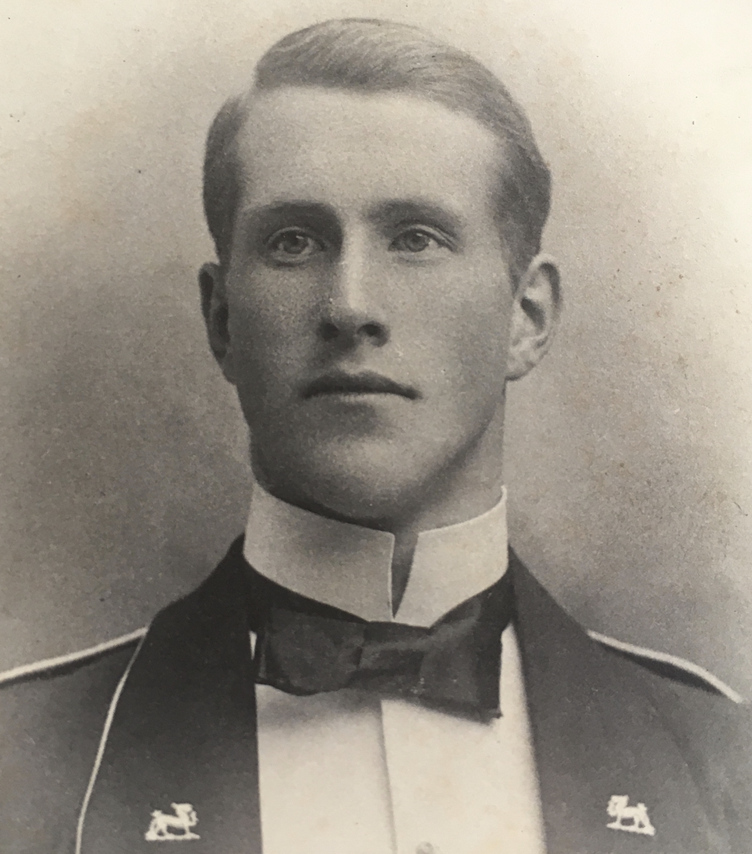
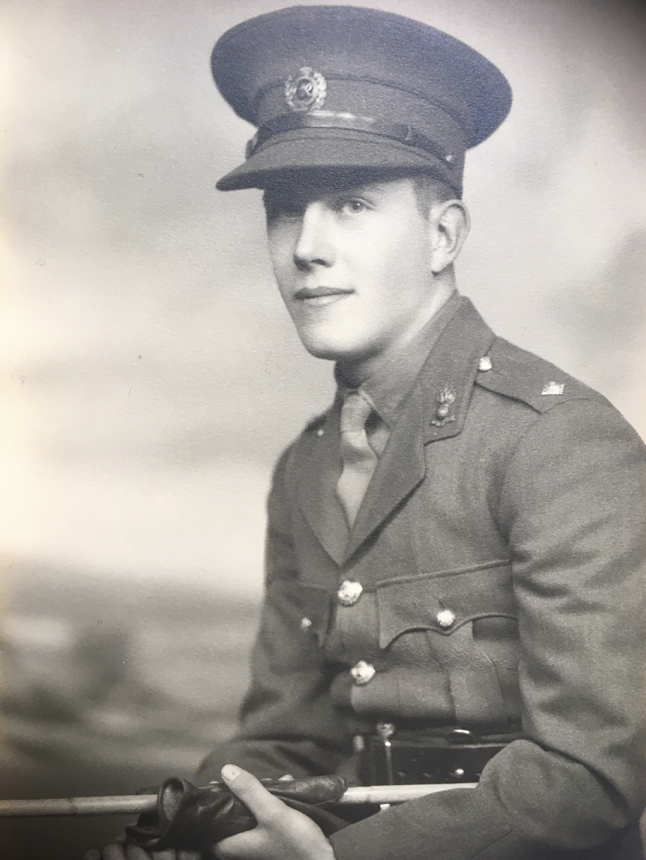
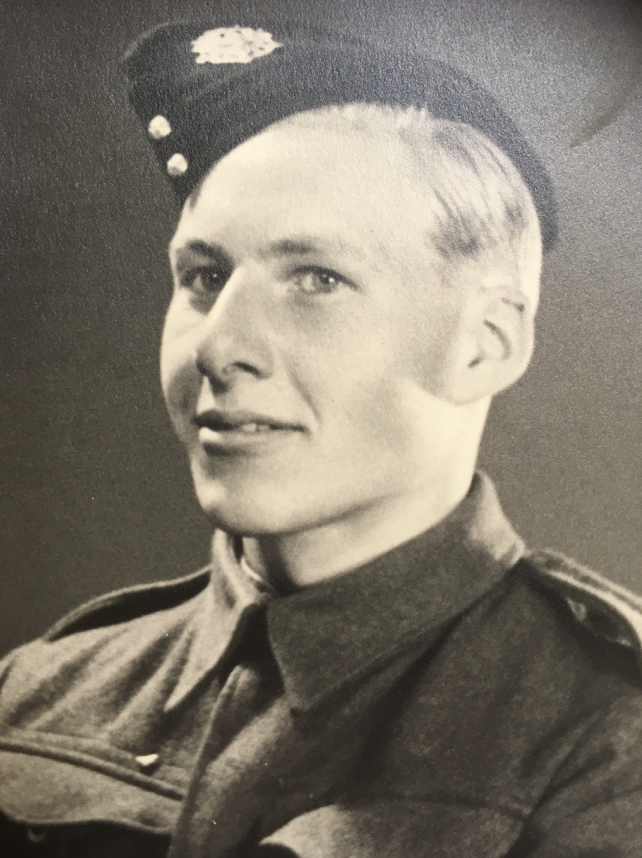
The General, feeling redundant and left out of the action, immediately donned his full uniform again. He motored up to Anne’s boarding school which was near to the Norfolk coast and therefore was in an area likely to be invaded if the ‘Bosch’ weren’t held at bay. Anne’s school chums were all very impressed when a still very good looking man arrived in a general’s uniform to pick his daughter up and take her back to the relative safety of Stevenage.
The residents of Stevenage joined the rest of the country in ensuring that their houses were blacked out. They received their gas masks and practised putting them on. Of course for CHTL gas masks were not a new thing: he had survived many a gas attack in the trenches and had also seen the horrific consequences of not being adequately protected from the deadly vapours. The siren outside the fire station in Stevenage was set up to raise the alarm as soon as word came that enemy planes were on their way.
When the first air raid sounded CHTL was up and dressed in his uniform, directing the family’s evacuation to their shelter in the garden. This was one of the few air raid shelters built in Stevenage. CHTL would have studied the plans issued by the government and no doubt added to the construction. His years of living in dugouts meant that he was an expert in what was needed in a good hole in the ground!
The ‘family’ consisted of Poppy, Anne and CHTL’s man servant. The latter in his haste to get to the shelter was mortified to find he had forgotten to bring his teeth. He was so embarrassed that he would be spending the night in a cramped Andersen shelter sans teeth, with two ladies; that he tried to return to the house for his choppers. CHTL ordered him back into the shelter and then proceeded to take up his position guarding the entrance from outside. This was not so much for his family’s protection as for his enjoyment of watching the battle being fought in the skies over London. He was back in the trenches when he couldn’t help himself but dive out of his dug out to watch the latest dog fight going on:
I cant really write sense as there are a stream of thin aeroplanes going overhead & (just run outside to see quite a good blaze go up) dropping bombs, these moons are the very curse. Just been out again, a shower of our own bullets falling all round, and the aeroplane going quietly home in the searchlight with shells bursting all round. Another is just coming over now dropping bombs. Been out again but too late as usual they are all over us, far away.
Letter to Poppy, Sept 27th 1917
The bombing in London in June 1940 was so heavy that the burning houses turned the sky red.
Stevenage suffered relatively little damage from bombing, being close to London. The railway was twice a target as the Stevenage line was one of the mainlines between the North and London. The ESA factory was hit as a consequence of the second attack on the railway line.
Home Guard
The Home Guard was the natural place for a redundant general to offer his services and CHTL was soon involved.
There was a great threat of invasion in May 1940, the Allies, including ”the whole root and core and brain of the British Army”, had been pushed back to the coast and were trapped on the French beaches facing capture or death, which Churchill later called ”a colossal military disaster”. The country was called to prayer. Churchill ordered the evacuation of the troops and 42 naval vessels headed for Dunkirk. Then between 27 May and the early hours of 4 June 1940 the ’Miracle of Dunkirk’ took place when a total of 338,226 soldiers were rescued from the beaches of Dunkirk by the navy and by the seven hundred ”little ships of Dunkirk” : a flotilla of R.N.L.I. lifeboats, merchant boats, fishing boats, private yachts and small boats - more used to being messed about in by families on a day out at the seaside than in being sailed across the Channel.These were manned by volunteers who responded to the hour of crisis as best they could. On the 4th June Churchill gave his rousing ’We shall fight on the beaches’ speech, immortalising the incredible Dunkirk evacuation as a ”miracle of deliverance”. We Shall Fight on the Beaches (1940) by Winston Leonard Spencer Churchill Delivered at the House of Commons, Westminster on 4 June 1940.
The men left at home, either for being too old, too young, not deemed fit enough or needed to work in reserved occupations to keep the country going, were frustrated that they couldn’t do anything to help stop the Germans from invading. Many of these men had fought in the Great War and didn’t want all that they had sacrificed then to be lost to this new offensive from the Bosch.
The Government decided to utilise these men and in a broadcast on 14th May, 1940, asked for volunteers for what was first called the LDV (Local Defence Volunteers): Winston Churchill changed the name of the LDV to the ’Home Guard’ on 23rd August, 1940. It was hoped that around 150,000 men would volunteer but five times that number signed up in the first month rising to over a million by the end of June 1940. They had been inspired by the Dunkirk volunteers who had risked their lives to help keep the Bosch at bay. Joining the Home Guard was a way that the men at home could feel that they were doing their bit.
CHTL was one of the million who responded to the call for a home based defence force, however his role was as Deputy Lord Lieutenant of Hertfordshire. The Secretary of State for War, Anthony Eden sent a telegram to all Lord Lieutenant of Counties in England, Scotland and Wales on 15th May 1940 requesting their support: “I am sure”, he wrote, “ that we may count on your co-operation and help in connection with the Local Defence Volunteer Force which, as I announced last night, the Government have decided to raise...” CHTL threw himself into the role, supporting the Lord Lieutenant of Hertfordshire, 3rd Viscount Hampden, Brigadier-General Brand.
’The Home Guard was formed with the intention of delaying an enemy invasion force for as long as possible and to give the Government and the regular army time to form a front line from which the enemy invasion could be repelled. When they were first formed, the Home Guard were expected to fight highly trained, well armed, German troops using nothing but shotguns, air rifles, old hunting rifles, museum pieces, bayonets, knives and pieces of gas-pipe with knives or bayonets welded on the end!’
Later on they were issued with more conventional weapons, but these proved challenging as most were either relics from the Great War or they were American or Canadian guns. This was where CHTL would have been in his element, mustering the troops, boosting morale, organising training for them in the use of their antique guns and generally feeling that he was doing his bit to once again defend his country. He’d have known Major Bulleid and his house in North Road where target training took place. No doubt CHTL also kept an eye on the drill practice on ground near the gas works in Sish Lane. Those in the Home Guard who had fought in WW1 would have responded to his command and those who were too young would have been in awe of the ’General’.
In 1940 there was a parade of the Home Guard through Stevenage with the first outing of their new ’armoured car’ donated by the ESA factory to the Stevenage L.D.V., then 6 Company, 3rd Hertfordshire Battalion. It was built in the ESA factory on the chassis of the company’s Bentley. This was much more sophisticated than Jones’s delivery van in ‘Dad’s Army’: the Stevenage Home Guard’s armoured vehicle was a heavily metal-plated adapted car that would afford its occupants the best possible protection from any attacks from marauding German invaders.
http://www.home-guard.org.ukhghistory.html
However this was not as much protection as one might have wanted. J.D. Sainsbury, a twenty-first century historian, commented: ’The ’armour’ would have been of mild, rather than hardened, steel, which could be penetrated by rifle bullets, and the huge weight of the body would have made the vehicle very slow and cumbersome. It’s most interesting feature [were] the two land-service Lewis guns, one in the ’Scarfe ring’ mounting that was used by observer-gunners in First World War biplanes.’
J.D.Sainsbury was perplexed by the standard of weaponry installed on the Stevenage car, in particular the two Lewis guns: ’How these two guns were obtained remains a mystery’.
p151 The Home Guard in Hertfordshire 1940-1945 J.D, Sainsbury -Sainsbury [2012]
Realising that CHTL had been ’appointed to command the machine Gun Training Centre at Grantham’ in January 1918 and in March 1918, ’was appointed Inspector of Machine Gun Units, General Headquarters, France’ and knowing that CHTL was an eclectic collector of WW1 battlefield debris, one can guess who managed to acquire the two guns! ‘I am now collecting a large mass of trophies …; machine guns, brass german shell cases and weapons of all sorts … 2 field guns …’ (Oct 3rd 1918)
Mr J. Appleton, Managing Director of the ESA factory, (Educational Supply Association) had donated the vehicle as his company’s contribution to the local war effort. His wife was rewarded for her husband’s generosity by being given the honour of inspecting the Home Guard, escorted by a very cheerful retired major-general dressed in full uniform: the Deputy Lord Lieutenant of Hertfordshire. The general had his arm in a sling, probably the result of his other enthusiastic contributions to the war effort.
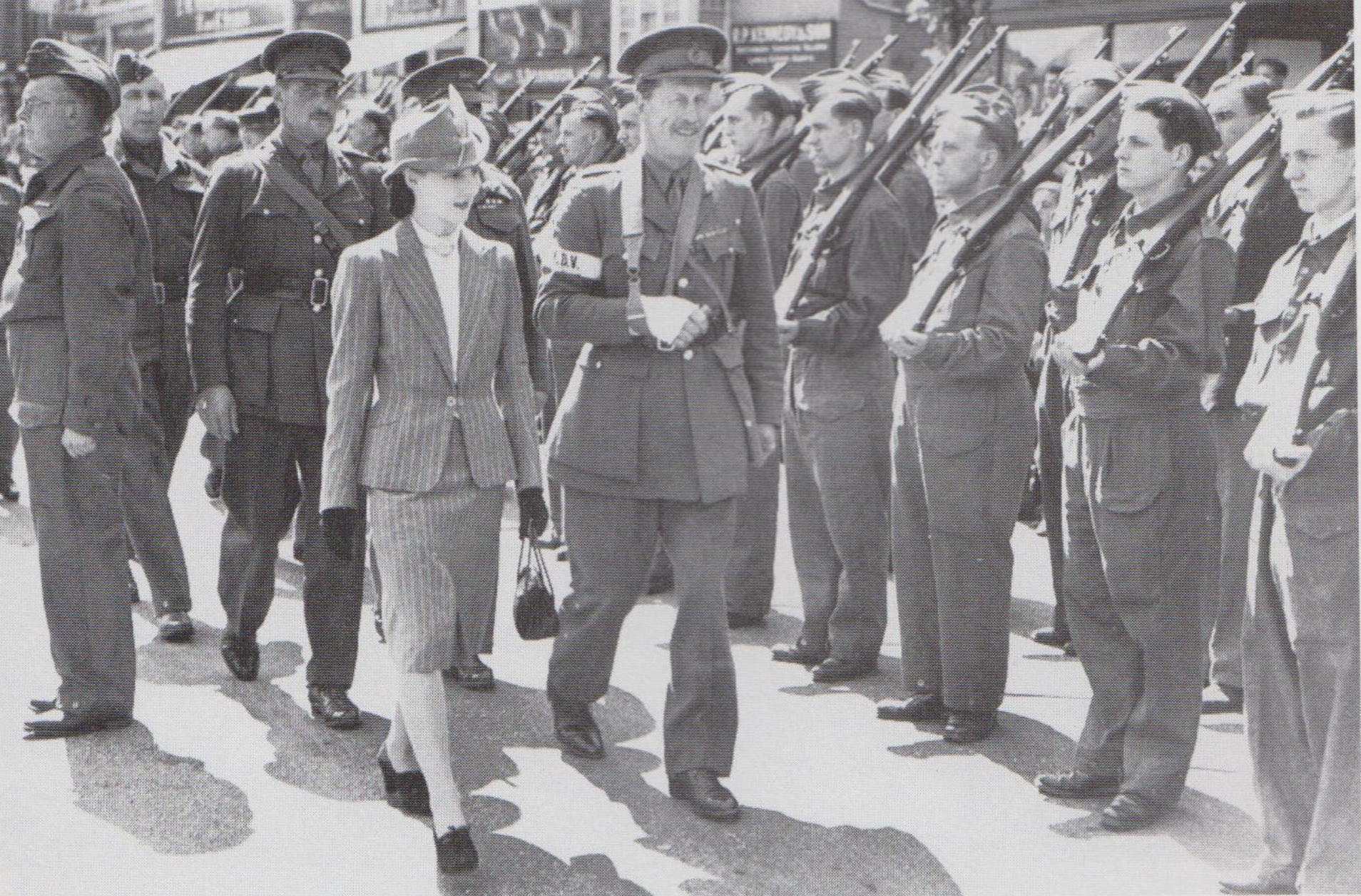
Feeding the Nation and a New Hobby
When he wasn’t guarding his dug out or parading with the Home Guard, CHTL spent the war growing vegetables and taking up Poppy’s speciality – breeding poultry. War time restrictions meant that he had to have a special licence to be a retail trader in ‘eggs, poultry including turkeys, fruit, vegetables fresh (other than potatoes)’. Having not been much of a gardener previously CHTL took to it like any challenge- with determination and an uncanny ability to excel at it. Poppy spent hours producing hundreds of jars of pickles and preserves, trying to keep up with the abundant harvests that her husband’s hard toil continuously produced.
Poppy and Anne volunteered for the Woman’s Voluntary Service and helped in the Soldiers’ Canteen which was set up in the Old Castle Inn. Poppy, ever sensible and not worrying about what others might think, took Anne’s old doll’s pram down to the canteen a mile away and returned with all the scraps of food to feed her hens. Anne served visiting servicemen, including Americans, endless cups of tea; accompanied no doubt with jam from her mother’s capacious larder full of preserves. Once she reached seventeen and had left school, Anne joined the Fannies. The Fannies were the girls who drove the ambulances and the general’s cars, and Anne had great fun.
Another astonishing war-time achievement, considering his missing fingers, was that CHTL asked his daughter to teach him to knit and he contributed many balaclavas for the troops. He also started making intricate carpets. He designed them and then stitched amazing patterns, incredibly neatly. Bill wrote to Anne after he’d been home for a few days on leave:
Father has started another carpet which seems to be very like his last one, but apparently it isn’t.
Bill to Anne - October 23rd 1939

Bill and Bob’s War
Whilst CHTL was involved with the Home Guard part-timers, Bill had joined the Royal Engineers and had soon showed he had outstanding skills and abilities. In December 1942 he was selected to join an elite group of soldiers and sailors in an experiment in a revolutionary new concept in warfare. The group were known as COPPs (Combined Operations Pilotage Parties). It was realised that there was a need for reconnaissance and guidance for assaults for beach invasions which COPPs were to supply.
Bill was involved in extremely dangerous missions which involved travelling into enemy waters in a submarine, transferring to canoes and then swimming ashore in shark infested waters to do a recce of the enemy’s defences, taking detailed notes and recording measurements of various kinds. CHTL had shown a talent for doing this when captured by the IRA, however he was not in possession of the sophisticated equipment that Bill became adept at using and his records of distances etc. must have seemed very crude in comparison to his son’s.
Like so many other concerned parents during the war, CHTL and Poppy never knew what their sons were involved in. CHTL understood the reasons behind censorship, although he had been frustrated by its restraints during his time on the Frontline. It was probably better that they knew as little as possible as knowledge brought extra anxiety. Few in the military knew about the existence of the COPPists and what they did; so it wasn’t until peacetime lifted restrictions that Bill was able to tell his family about his exploits.
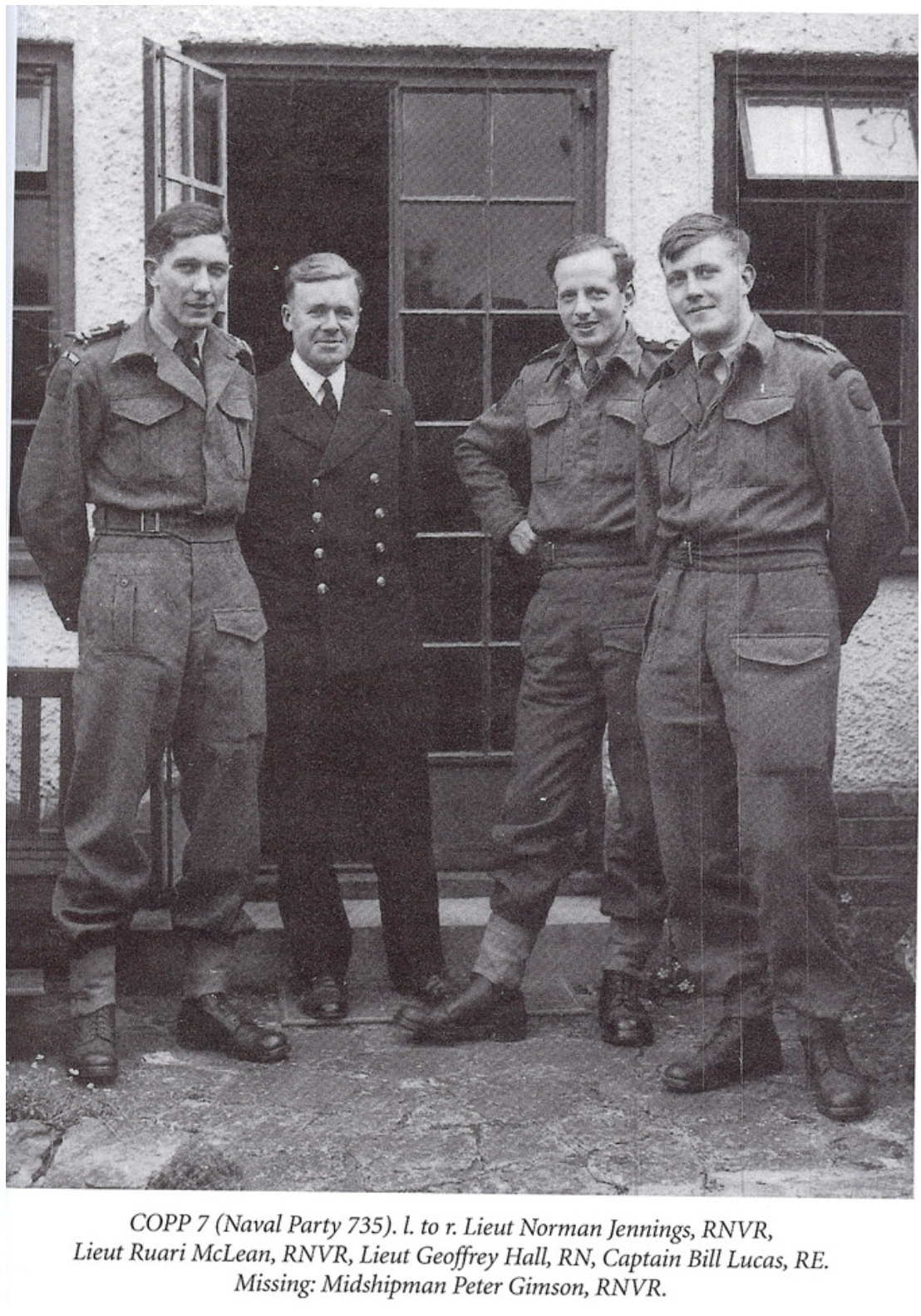
British troops were engaged in fighting the Japanese in Burma. Among them was Bob who was a Lieutenant in the Reconnaissance Corps having originally joined the Royal Berks Regiment. The only ‘war story’ Bob ever told about his time in Burma was when he was sent to retrieve crates of supplies that had been air dropped. These were to be loaded onto lorries and transported to the waiting troops. On one occasion two crates burst open on impact meaning that the contents couldn’t be easily transferred on. Bob delighted in describing how he and his men were ‘forced’ to eat the contents of these particular containers. The lads enjoyed a sumptuous feast of tinned peaches and condensed milk – making it one of the best days of the war!
Burma was a tough place to be and Bob never spoke about the fighting he’d been involved in. He spent a rest period in India and it was here that he had a life changing experience. He was in the middle of nowhere, all alone when he heard what he described as an audible voice, saying: ‘I gave myself for you, why won’t you give yourself to me?’ Bob believed this to be the voice of Christ calling Bob to follow him. Without hesitating Bob responded and committed his life to serving God.
Bill had become a committed Christian at Marlborough, but Bob had always resisted his brother’s urges to change his ways. Now there was no stopping Bob’s enthusiasm for his new found faith and he began to avidly read the Bible. He decided after reading the New Testament that he should give away his money. He wrote to his father, as his power of attorney, explaining his decision and asking that his father would give certain amounts to various charities and recipients. Bob never doubted that his father honoured his request: however years later, when Bob went over the amounts he’d requested to be donated, he realised that he’d asked for more money to be given away than he actually had! The only possible conclusion to this conundrum was that CHTL had made up the shortfall from his own pocket.
It’s hard to know what CHTL felt when both his sons turned their backs on the army or any lucrative careers that may have been open to them, choosing to follow the religious calling they both were fully committed to. It appears that both boys reverted back to their Quaker roots and the belief that each person is ‘equal in the sight of God’ and capable of receiving the ‘light of God’s spirit and wisdom’. CHTL must have been uncomfortable with such strong views which contrasted with his view of the world and yet, although he didn’t go along with his sons’ religious zeal, he respected their right to hold their beliefs and follow the path they believed they were called to.
COPP7, the group Bill was assigned to, was sent to India and it was while Bill was in India that he was able to meet up with his brother and share the joy of Bob’s new found faith. This brought the brothers even closer together and formed a strong bond between them.
Whilst in India Bill went down with malaria. In a feverish state poor Bill had a close encounter with the regimental ‘gnu’. This wildebeest was possibly a descent of the wildebeests brought back by South Wales Borderers from the Boer War. For some reason the wildebeest took a violent dislike to the sickly Bill and attacked him. Despite being well below par the commando in him took over and Bill defended himself by thrusting his thumbs into the raging gnu’s eyes and instantly slaying the beast. The regiment were not amused to have lost their mascot. CHTL was highly amused but poor Poppy was shocked to receive Bob’s telegram informing his parents of their son’s near death experience:
Bill bruised battling bull, Bob
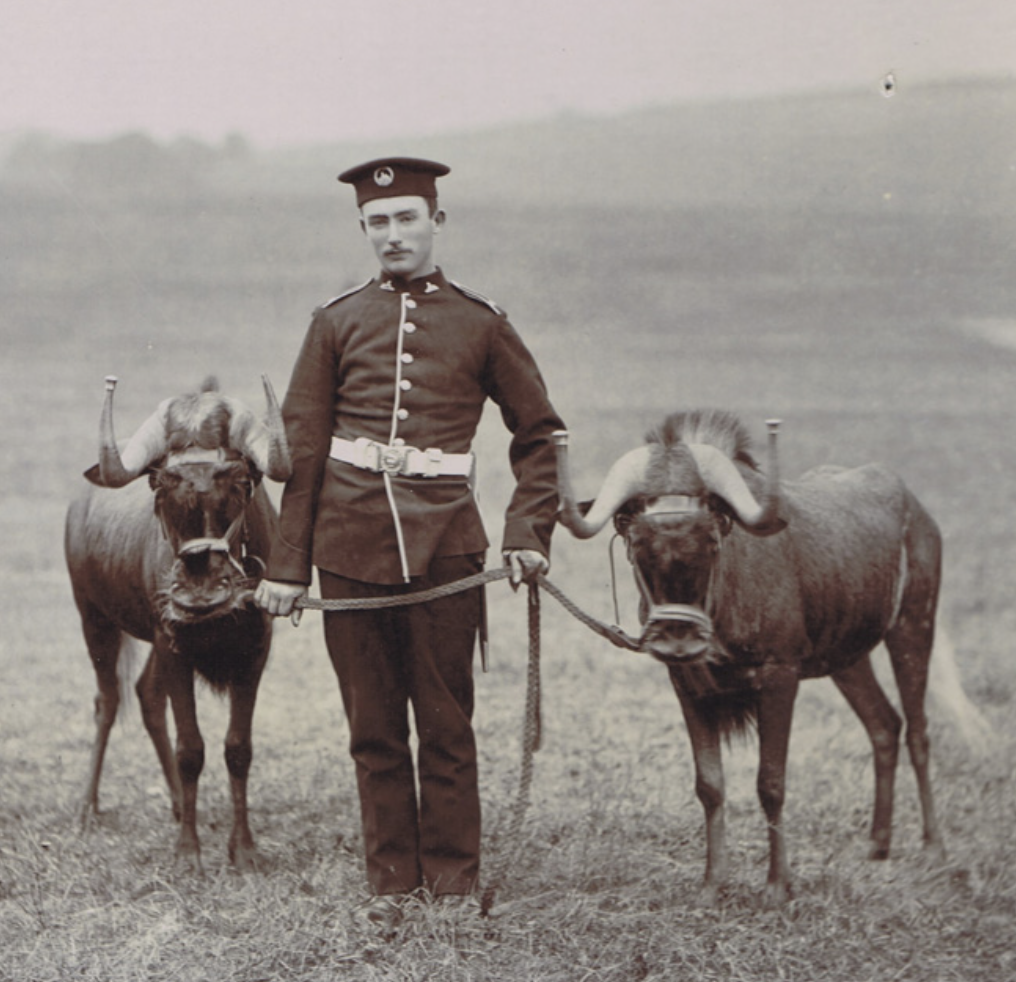
Following numerous recces on the beaches of Burma, Bill went on to take part in Operation Frippery, which gathered together detailed reconnaissance of beaches along the coast of Sumatra in preparation for a planned invasion of the island. It was an extremely dangerous mission, with the group coming close to losing their lives on more than one occasion, but Bill came through it and was awarded an MBE for his services.
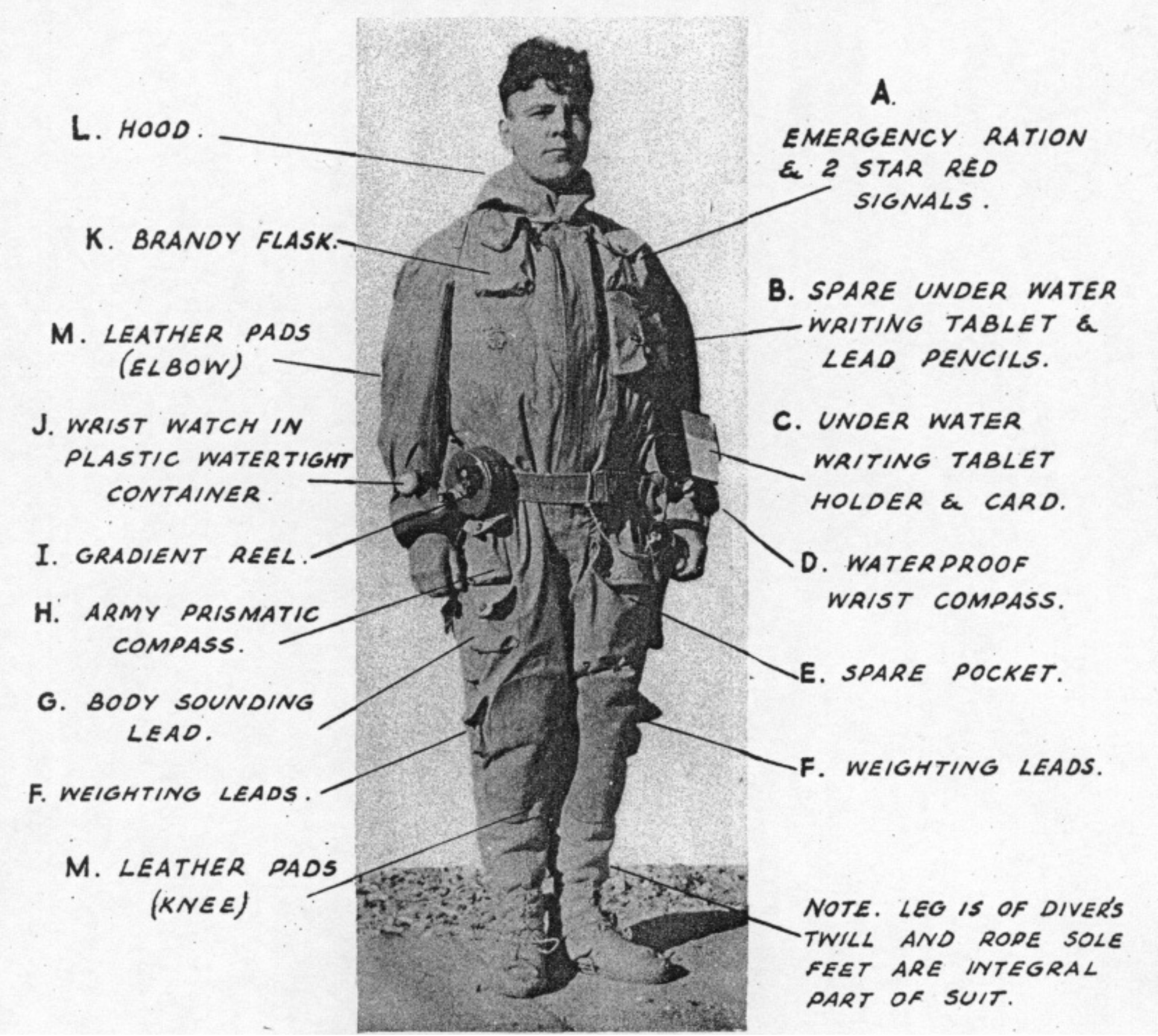
CHTL and Poppy couldn’t have been prouder of their son. He like his father had faced immeasurable dangers with bravery and fortitude and a lot of good humour: although Lucas Junior was sure to avoid the vices his father indulged in to help him cope with the horrors he saw. Bill’s coping mechanism was found on his knees and in a well-read leather bound book, not in a bottle of whiskey!
